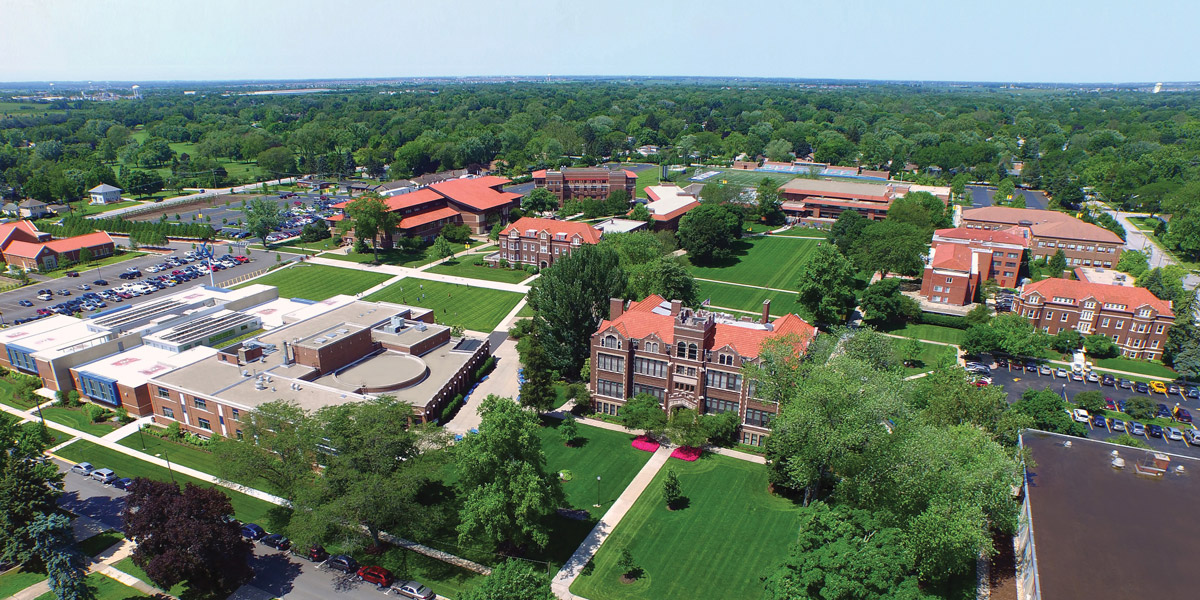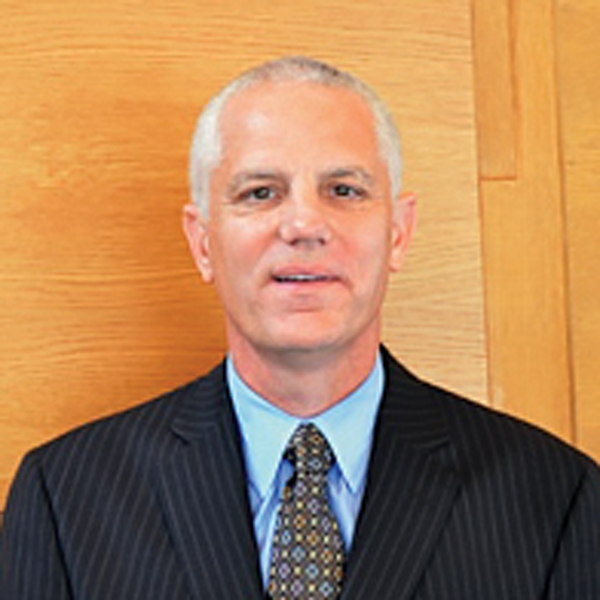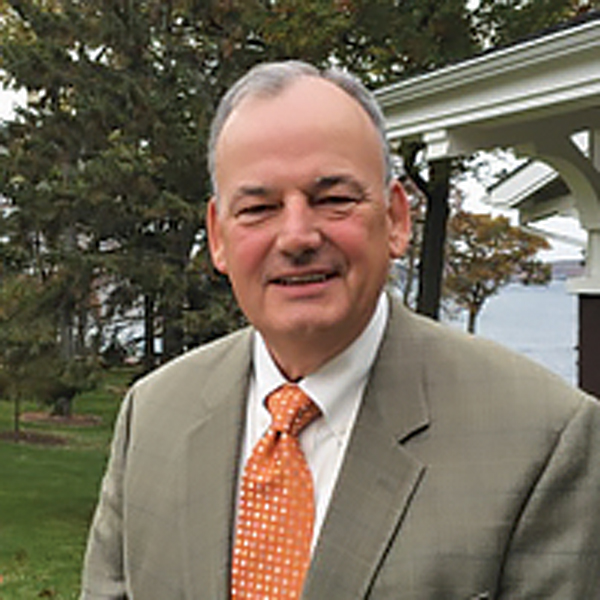A View from the Board of Trustees

The Aurora University Board of Trustees remains focused on the new strategic plan and the challenges ahead. The plan, approved by the Board last November, will guide institutional decision-making through 2024.
In a conversation that took place this past March, Vice Chairs of the Board John Ammons ’83 and Douglas Craft ’75 discuss what’s in store for AU, how they navigated the pandemic, and why it’s important to give back.

Ammons is president of Wheatland Title Guaranty Company in Yorkville, Illinois. After cofounding Wheatland in 1982, he built the company into one of the largest title agencies in Illinois. Ammons joined AU’s Board of Trustees in 2013, where he also serves as vice chair of the finance committee. His grandparents, Clayton Day and Dorothy Day (née Ames), graduated from Aurora College in 1929, and many in their family are AU alumni.

Craft is a retired executive vice president of Fiserv Inc., a payments and financial services technology company in Brookfield, Wisconsin. He joined AU’s board in 2015, where he also serves as chair of the finance committee. Craft earned his MBA from Northern Illinois University in 1977. He is the former chairman of the board of Pius XI Catholic High School in Milwaukee.
The following is an edited conversation.
Aurora University: What is the Board’s role in the strategic plan?
Craft: We are the fiduciary stewards of the strategic plan, and as fiduciaries, we need to look at the strategy and the mission statement and make sure those things are getting accomplished. We aren’t the day-to-day operators of the university by any stretch. Our job is to review strategy and make recommendations to senior administration. We are a sounding board for senior management as opposed to a directional force.
Ammons: Our job as stewards is important. We keep that mission statement in front of us at all times. I know how to run a business, so I add my view from that perspective to get us to operate more like a business within the structure of a higher-education learning institution.
Craft: I agree. Bringing that business perspective to the table is crucial because we don’t have the large endowment or pool of alumni giving that other universities do to finance operations.
Our business model is not an endowment model; it’s a tuition model. It is the model we have. It’s a good model. It keeps us on our toes. That’s why it is important to have people on the Board who know how to run a viable business and how to create products and services that people will pay for.
AU: How does the finance committee fit into the plan?
Craft: It’s up to the finance committee to foster innovative and entrepreneurial approaches to the business model. Our role is to ensure that we have the financial resources in the future to support the strategic initiatives. It’s our job to ask: How are we creating resources, and how are we going to allocate them? Strategy is nothing more than the mission-driven allocation of scarce resources. What we attempt to do through the finance committee is really to accomplish that allocation methodology.
The new autism initiative, the new men’s and women’s wrestling programs, the Plus One accelerated graduate degrees: these are all opportunities to create more resources and accomplish what AU’s mission and vision statements tell us. We’re blessed with strong senior administration staff members who think through all of this. From the role of trustees, we need to get everyone focused on the strategic plan.
Ammons: One of the most important roles the finance committee has is to monitor AU’s financial health, including the institution’s performance against approved budgets. Even with the pandemic crisis, we are in good financial standing and are on track to have a budget surplus this year.
As I look at the past year and at the direction we are headed, I really do believe AU’s core values statement is how we accomplish the strategic plan. When I first joined the board eight years ago, the values statement quickly caught my attention. “We live within our means and manage our resources wisely and responsibly, while sustaining an environment that fosters teamwork and promotes service to others.” Those are the values that guide the work of the finance committee.
AU: Has the COVID-19 crisis increased a sense of urgency on the board?
Ammons: You have to manage through a crisis, and that’s where the board helps. AU will come out stronger from the COVID-19 crisis, just like we did a few years ago during the Illinois budget crisis, when we temporarily lost MAP [Monetary Award Program] grants, which are state-funded, need-based grants that help students pay for tuition and fees. AU has traditionally relied on MAP dollars to support up to 9% of our annual operating budget. We’ve got to run this budget from the standpoint that MAP could disappear at any given time. We are fortunate to have a president and senior leadership that can manage AU through a crisis. The board is a key element in that process in terms of finance.
Craft: I see COVID-19 as a temporary issue. Strategic planning is long range. And most of the issues facing us are long-range issues. COVID-19 to me was a black swan; nobody saw that coming. But the response has just been phenomenal in terms of how quickly the president and her senior staff made adjustments and decisions and moved forward.
We will get COVID-19 under control, and we will return to some normality. But down the road, colleges and universities will soon be facing increased competition due in large part to the “enrollment cliff.” There is a demographic shift happening, particularly in the Midwest, where the number of high school graduates will decrease in the years ahead, and that means a shrinking pool of potential college freshmen.
AU: You are both generous donors. Why do you give?
Ammons: I always saw my grandparents and parents giving. That helped to mold me. I grew up in Sandwich, Illinois, a small town, and going to AU opened up a whole new world for me. I had a great internship at a law firm when I was at AU, and that led me to starting Wheatland Title with one of the partners at the firm. The company grew from there, and it all started at AU.
I give to help students start on a path to success and make an impact in the world. I need to give back. We have a responsibility as individuals to help the community and the world become better places.
Craft: I, too, grew up in a small town. I come from a large Catholic family and was known as “one of the Craft boys” for most of my life — until I came to AU. At AU, I became Doug Craft. I received a freshman scholarship, which got me into the school relatively cheaply. I also earned my way through school with the help of work-study programs. There is no way a kid like me could have gone to college without these programs. Somebody that I didn’t see or know was donating money that was affecting my life in a transformative way. It was life changing for me.
If you look back at the founding of the college in 1893 in Mendota, Illinois, and then at the early years when the college relocated to Aurora, you see all the financial struggles these people had, and the sacrifices they made to keep the college going. There’s an awful lot of giving back in this tradition, and it’s a tradition that needs to go forward.